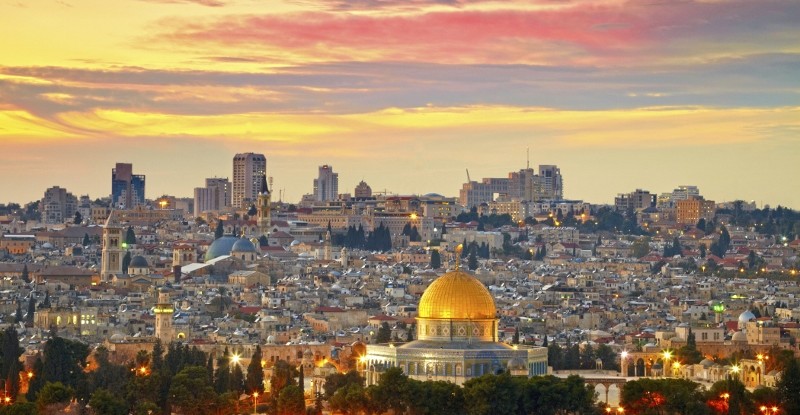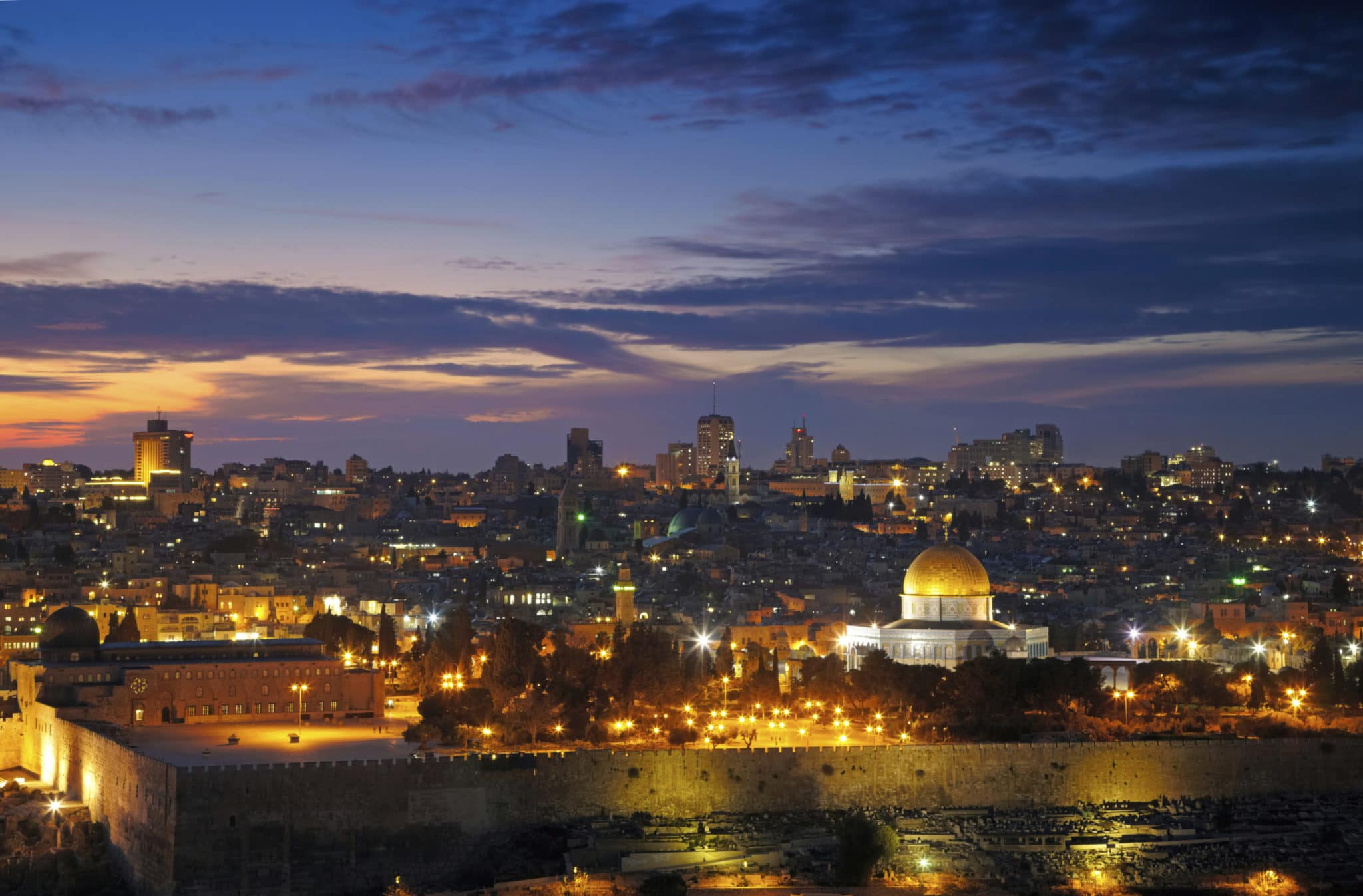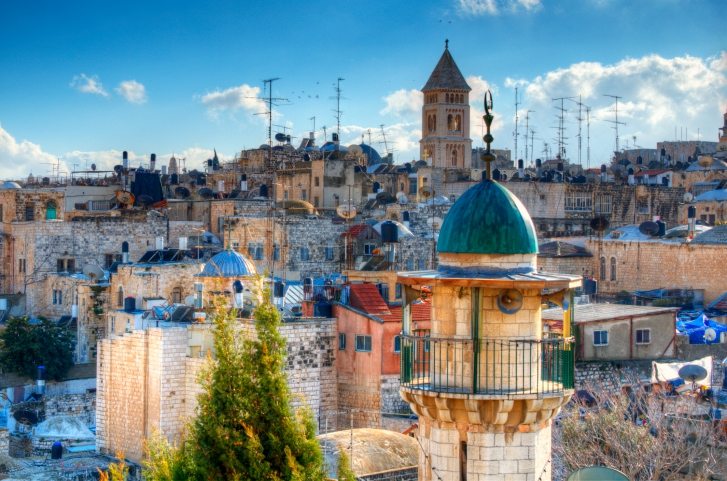It shall come to pass in the last days that the mountain of G-d’s house shall be established on top of the mountains and all the nations shall flow unto it. And many nations shall go and say, let us go up to the mountain of G-d and we will teach us of his ways and we will walk in his paths, for from Zion shall go forth the Torah; and the word of G-d from Jerusalem. And he shall judge among the nations and they shall beat their swords into plowshares and their spears into pruning hooks, nation shall not lift up sword against nation, neither shall they learn war any more – Isaiah 2:2-4
My house shall be acclaimed as a house of prayer for all people – Isaiah 56:7
Had the nations of the world known how much they benefit and are blessed by the Holy Temple they would have surrounded it with legions of armies to protect it from any harm – Bamidbar Rabba 1:3. Tanchuma Bechukosei 2. See Talmud, Sukkah 55b
In response to last week’s article about the spiritual centrality of Israel, I would like to address one particular issue that was raised, regarding the role of the non-Jew in the big picture. It’s all well and fine to say that Jews must reconnect with their own spirituality if they are to have a healthy relationship with the Promised Land. But where does that leave the non-Jewish world, including the many Arabs living in Israel today?
My friend Richard put it this way:
“Your message is, as always, presented eloquently and very much on the spiritual mark. However, in dealing with the problems of present-day Israeli, I feel it lacks a full perspective. No, I haven’t been to Israel lately – or ever. And I certainly can’t lay claim to the same emotional and spiritual connection you have with that amazing place.
“But I can relate to both the concept and manifestations of fairness. In this light, how do you think your message would be interpreted by a law abiding Palestinian? Your message says that the response – if not the answer – to Israel’s problems should be a Jewish reconnection with traditional spiritual values. That’s all well and good. But can we infer that Jews who reconnect at that level will also recognize the need and the mechanisms to reconnect with centrist Palestinians?
“Your only mention of the Palestinian population was by inference – and that, by your reference to the most recent and horrible atrocities. Are centrist Palestinians left to simply hope that a Jewish spiritual reconnection will play out in the form of reasonable political decisions and behavior (the wall/the settlements)? Is their only hope that G-d, in his wisdom, will somehow intervene to bring peace to all sides – if and when Jews trigger the appropriate response from him?
“Or, even more on the edge, if G-d’s promise of a promised land is for Jews only, can the Palestinians hope for anything better than their own neutralization as a manifestation of G-d’s will? Would G-d sanction such a thing?
“Like many people who love the Torah, I find myself increasingly unable to avoid such questions.”
* * *
There is a basic misunderstanding about the Torah view on the role and relationship of Jews and non-Jews, and by extension, between Israel and other countries of the world.
The prevalent view – both among Jews and non-Jews – is that there is a fundamental, irreparable rift between Jews and non-Jews, with no real change in sight. This frightening view dominates much of the discourse on the topic of the Jews, Israel and the world – a discourse that feeds, as mentioned, a serious distortion of the issue.
Perhaps this is due to the long history of anti-Semitism and the deep-rooted distrust between Jews and non-Jews that has pervaded our collective psyche and clouds our judgment. Many non-Jews carry profound stereotypes about Jews. The images and myths include elitist, parasites, hucksters, money lovers, moneylenders, Shylocks, Christ killers – the list goes on. Many Jews in turn are utterly suspicious of non-Jews. And for good reason. History is witness to the endless persecution, executions, genocides that Jews have endured in country after country, under the rules of nation after nation. Egyptians. Assyrians. Babylonians. Greek. Syrians. Romans. Crusaders. Inquisition. Pogroms. Holocaust.
This tragic history of divisiveness has monopolized and defined the relationship between Jew and Gentile, leaving us with a hopeless sense that this is a permanent, inherent tension.
But is this divisiveness the way it was meant to be and are we doomed to its destiny? Is there anything more about the relationship between the nations and the Jews besides their battles? Is their anything deeper?
It is true that in the last few centuries much has changed in the world. Oppressive regimes of old have been replaced by democracies. Many countries, beginning with the powerful USA, have become havens of religious freedom. The forces of emancipation now predominate around the world and they have allowed Jews (and for that matter, people of all persuasions) unprecedented opportunities and equalities. There are many places in the world today where Jews can live in peace and freedom. Simply a miracle and a blessing – especially when contrasted to the world of just 200 years ago. Yet, the argument still rages – especially since October 7th and the ensuing demonstrations of vile hatred – whether anti-Semitism has actually waned, or has it just evolved into one with “manners.” Can and will Jews and non-Jews ever be at complete peace with each other? Will the Arab world and the rest of the world ever be able to coexist with a Jewish Israel?
Just read this week’s Torah portion and you have the entire story before you. Even after the Egyptians allow the Jewish people to be free after 210 years of oppression, they have a change of mind and decide to pursue the Jews. At this point, the only solution to end the Egyptian obstinate obsession with the Jews is to have them all drown in the Red Sea. Give us a break! We were enslaved by you for centuries – let us now leave in peace! But no, they cannot let go. How many times has this been repeated in history? Is this our destiny?
Uncomfortable questions? Politically incorrect issues?
Indeed. Perhaps this discussion is uncomfortable to those that see no hope. I, for one, am quite comfortable to discuss these issues, because when we get beyond the misconceptions, there is very much to look forward to, both for Jews and non-Jews.
The time has come to be blunt.
Truth be told, the division between Jews and Gentiles goes back to the beginning of history. Esau and Jacob were feuding already in their mother’s womb.
“Two nations are in your womb. Two governments will separate from inside you. The upper hand will go from one nation to the other. The greater one will serve the younger.”
And that has been the story ever since.
Based on this, some argue that we are destined to a perpetual battle between the nations and Jews.
However, there is another critical angle to this story that has been sorely overlooked. When Jacob finally meets and reconciles with Esau, Esau invites him to live side by side in harmony. Jacob replies that Esau should go ahead, and he will follow. “The children are young and the sheep are tender, we must travel slowly. You travel ahead and we will catch up with you.” Rashi explains that Jacob was referring to the end of days when Jacob and Esau will finally be at complete peace with each other.
The world of the future is one in which all nations will be united under one G-d. “Then I will turn to the peoples a pure tongue that all will call upon the Name of G-d and serve Him with one consent.”
But isn’t it true that the Bible calls the Jewish nation the “chosen people.” Doesn’t the Torah “separate” Jews from non-Jews? Isn’t that a sore point – a root of much resentment (or as some cynics say: Only Jews are bothered by it…).
Well, well. The Chinese believe that they are at the center of the universe. The Japanese call themselves the land of the Rising Sun: the sun rises first in Japan and then in the rest of the world. America considers itself the land of Manifest Destiny. Virtually every people, every race, every county has its nationalistic pride. Yet, no one resents them for it. No one kills them for it. Why? Because, as Dennis Prager puts it, we don’t believe it! When it comes to the Jews, the world actually believes that they are the “chosen people.”
But what does the Torah believe? What does “chosen” really mean? What does it mean that there is “division between Jews and the nations”? Since G-d created us all, aren’t we all equals in the eyes of G-d?
I was once invited to deliver a talk for a group of Protestant pastors about the Jewish view on Messiah and the Redemption. I discussed the spiritual transformation the world would undergo in the near future. A world filled with Divine knowledge, in which all nations stand united under one G-d while maintaining their diversity. At the end of my talk, one of the hosts thanked me on behalf of the group, and asked me this question:
“We all agree with your eloquent presentation of the world unity that will prevail in the Redemption. Yet, one dilemma remains: the identity of the Messiah. We Christians believe that is Jesus, someone that Jews have categorically rejected. How will we ever be united on this contested point?
What was I going to say? Here are the words that came to me at the time:
“Let’s put it this way. The Messiah will be one Jew or another…”
The crowd laughed uncomfortably, and they left it at that.
The Jews are chosen to serve a unique spiritual mission. There is absolutely nothing racist, supremist or condescending about that. Every nation, every person in this world – Jew or non-Jews – has been chosen by G-d to serve a particular calling. Each of us was created in the Divine Image and plays an indispensable role that no one but you can fulfill.
Every nation has its role. The Jews have their role. Thomas Cahill in The Gifts of the Jews and Michael Novak in On Two Wings powerfully explain the great contribution of the Jewish people to the universe. The Jews gave us, they write, a new vision of men and women with unique destinies. The Torah teaches us a vision that life has purpose and progresses forward toward a destination. History has a beginning and is guided by Divine Providence for a purpose. Everything in creation is suffused with reason. This vision, as they write, would thousands of years later inspire the Declaration of Independence and our hopeful belief in progress and the sense that tomorrow can be better than today.
Nothing to be ashamed of.
John Adams wrote:
“I will insist that the Hebrews have done more to civilize men than any other nation…. They are the most glorious Nation that ever inhabited the earth. The Romans and their Empire were but a bauble in comparison to the Jews. They have given religion to three-quarters of the Globe and have influenced the affairs of Mankind more, and more happily than any other Nation, ancient or modern… [even if I were an atheist] I should believe that chance had ordered the Jews to preserve and propagate to all mankind the doctrine of a supreme, intelligent, wise, almighty sovereign of the universe, which I believe to be the great essential principle of all morality, and consequently of all civilization.”
Nothing to be ashamed of.
The time has come for Jews, and for people everywhere, to stop being embarrassed of their unique spiritual role. That is the meaning of true emancipation – not merely physical freedom, but spiritual emancipation. When we feel free to express and fulfill our true spiritual mission in this world.
As a “light unto nations” Jews have a unique spiritual role to awaken each other and the world to its own deep spiritual destiny.
By no means does this preclude other people’s role in being spiritual leaders. Indeed, we find many great sources of inspiration from special souls among all the nations of the world. At the same time, Jews have historically served as spiritual beacons, and must continue to rise to this calling.
The universe and all its people and components are integrally connected. We are one large network, with each part affecting all the others.
When any individual lives up to his or her spiritual calling, all other people benefit. One individual’s spiritual awareness heightens the spiritual awareness of all surrounding people. This, of course, includes especially the Jew. As a “light unto nations” when Jews live up to their spiritual calling, the entire world reaps benefits.
This brings is back to the Promised Land. Israel is the bridge between heaven and earth for all the nations of the world. When Israel is secure physically and spiritually, all people will be at peace.
For this reason everyone gravitates to the Holy Land. Unconsciously, ever nation, religion and individual senses that Israel is the spiritual vortex of existence, the place where the doors open up to reach the Divine.
Thus, the connection of Jews to Israel – which is essential to the Jewish connection to the soul – is critical to the physical and spiritual welfare of the entire world. No one will be neutralized as a result. On the contrary: Everyone’s unique spirituality will emerge in a world where Israel’s spiritual power is allowed to emanate forth.
The imminent world of Redemption is described by Maimonides as a world when there will be “neither famine nor war, neither envy nor strife, because good will emanate in abundance and all delightful things will be accessible as dust. The one preoccupation of the entire world will be solely to know G-d.”
To usher in this era we – Jews and non-Jews – have to integrate spirituality into our material lives. Israel, the nation and the land, are here to help us all to achieve this ultimate purpose of life.
Peace in Israel, in the spiritual hub of the universe, will bring peace to the entire world.
The Jewish search for the Promised Land is not some partisan, nationalistic effort. It is not just a “Jewish” thing, but a universal one. It is one with the global search of all mankind to find peace between heaven and earth, between spirit and matter.
When Israel becomes our spiritual center, and Jews recognize their spiritual connection to Israel, what results is a more sensitive world, a more peaceful universe – a universe that recognizes the inherent sanctity in all human beings, Jew or non-Jew, Christian or Muslim, Israeli or Arab.
We may or may not have an exact strategy how to deal with law abiding Arabs living in the Promised Land. [Non-law abiding citizens need to be dealt with severely and decisively. Ambiguity is disastrous in such a situation.] But one thing we know for sure: When everyone recognizes the spiritual centrality of Israel, when Jews get in touch with their own souls, when all people reconnect with Divine and the Divine laws for all mankind, we will all be at peace, with no one compromised.
Law abiding means following the laws of G-d that respects the fundamental sanctity of all life. The tragedy today in Israel is the loss of all life, Jewish and Arab. True peace is only possible when all peoples embrace the Divine law passed on to us beginning from Abraham, father of all nations. Only when we access our inherent spirituality will we be united. Anything else – no matter how beautiful – divides us.
An Israel in exile – disconnected from its soul – bodes conflict among all people.
Israel’s spiritual centrality and Jewish spiritual renaissance is not just a matter for Jews. Indeed, its is vital to the survival of all nations of the world.
Are we ready to embrace this message? Do we have the courage?








If each person and group has its unique living path from the same God, would not the true egalitarian spirit be able to find spiritual nourishment in the others religious world? I would say unless we can affirm that Our God is wholly vested in the others religion- to the degree that I may be nourished by it if I choose to enter- then we still maintain a superior position which will never convince an abiding adventure of true brotherhood before our common Father.
Beside choice of one G-d and many pathes, one obviously has a choice to go from or towards to the ideals, and ultimately away or closer to G-d. Pathes may be the same but direction may be differet…
Thank you Rabbi. One of the great gifts I learned on the “Noahide” path – is: we each have roles. My role is to come alongside. Commit to the Torah – the one truth and work to grow each day and shed as much light as my neshama can. It’s the same as with a man and woman ; in some ways. Each has their unique role and light to bring. The Jewish people have been assigned ; undertaken an enormous task for us all. The Tikkun of this world. For HaShem to be revealed in and return. Many hearts will break when we realize what the Jewish people do and have done for us all. HaShem be with you all. Amen